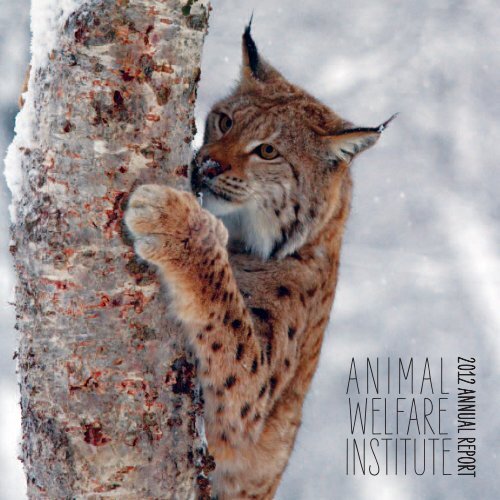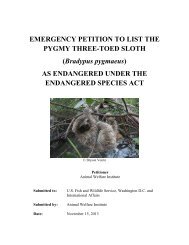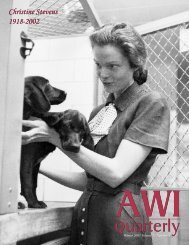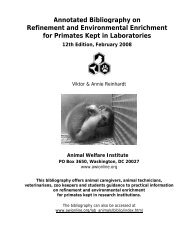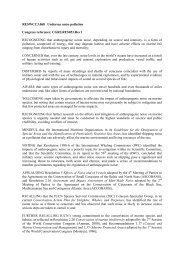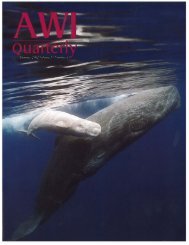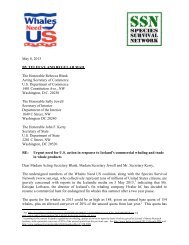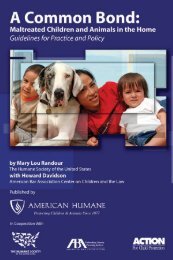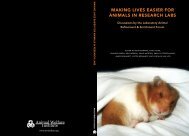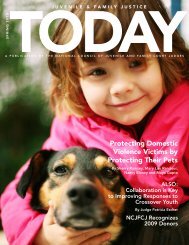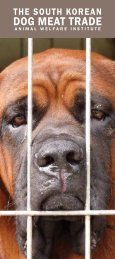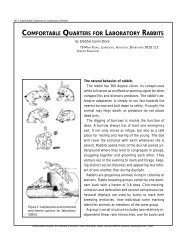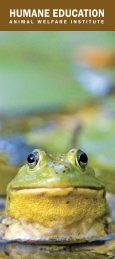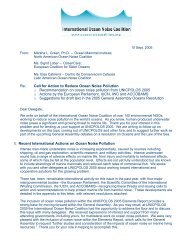AnimAl WelfAre institute
AnimAl WelfAre institute
AnimAl WelfAre institute
You also want an ePaper? Increase the reach of your titles
YUMPU automatically turns print PDFs into web optimized ePapers that Google loves.
Animal<br />
Welfare<br />
Institute<br />
2012 Annual Report
Animal Welfare Institute<br />
6 Annual Report<br />
July 1, 2011 - June 30, 2012
Table of Contents<br />
About AWI<br />
1<br />
Companion Animals<br />
2<br />
Farm Animals<br />
5<br />
Wildlife<br />
8<br />
Marine Life<br />
12<br />
Animals In Laboratories<br />
15<br />
Government & Legal Affairs<br />
18<br />
AWI Quarterly<br />
21<br />
Speeches made & Meetings attended<br />
28<br />
Financial Statements<br />
32
Animal Welfare Institute<br />
For over 60 years, the Animal Welfare Institute (AWI), a<br />
non-profit charitable organization, has been dedicated to<br />
alleviating suffering inflicted on animals by humans.<br />
AWI’S AIMS<br />
Through engagement with policymakers, scientists,<br />
industry, and the public, AWI seeks to:<br />
Abolish factory farms, support high-welfare family farms,<br />
and achieve humane slaughter for animals raised for food;<br />
Improve the housing and handling of animals in research,<br />
and encourage the development and implementation of<br />
alternatives to experimentation on live animals;<br />
End the use of steel-jaw leghold traps and reform other<br />
brutal methods of capturing and killing wildlife;<br />
Preserve species threatened with extinction, and<br />
protect wildlife from harmful exploitation and destruction<br />
of critical habitat;<br />
Protect companion animals from cruelty and violence,<br />
including appalling conditions in commercial trade; and<br />
Prevent injury and death of animals caused by harsh<br />
transport conditions.
Companion Animals<br />
AWI promotes responsible care of companion animals and develops resources for<br />
law enforcement officials to help them prosecute crimes of animal abuse.<br />
Prosecution of Animal Cruelty<br />
Although animal cruelty is known to be a<br />
precursor to many forms of interpersonal<br />
violence, little information is gathered<br />
on individuals who commit such crimes,<br />
where it occurs, or what programs are<br />
effective in addressing it. AWI seeks<br />
to change that. This year, AWI worked<br />
cooperatively with the Federal Bureau of<br />
Investigation (FBI) to expand and improve<br />
methods of recording animal cruelty crime<br />
statistics so that they can be included<br />
in the FBI’s Uniform Crime Report and<br />
thereby facilitate more informed analysis<br />
and response to these crimes.<br />
In April, AWI published Animal Cruelty<br />
Crime Statistics: Findings from a Survey<br />
of State Uniform Crime Reporting<br />
Programs, which details the results of a<br />
survey developed by AWI in conjunction<br />
with consultant, Dr. Lynn Addington, with<br />
assistance from the Association of State<br />
Uniform Crime Reporting Programs. The<br />
survey was sent to state crime-reporting<br />
agencies to ascertain if and how they<br />
collect and maintain animal cruelty crime<br />
statistics. Following publication of the<br />
report, AWI’s Nancy Blaney and Mary Lou<br />
Randour met with officials from the FBI’s<br />
Criminal Justice Information Services<br />
department to delineate next steps in<br />
the process for the FBI to include animal<br />
cruelty crimes in its statistical database.<br />
AWI helps design, edit and produce Lex<br />
Canis, the quarterly newsletter of the<br />
Association of Prosecuting Attorney’s<br />
(APA) National Animal Cruelty and Animal<br />
Fighting Initiative. In January, Nancy<br />
and Mary Lou participated in the annual<br />
meeting of the APA’s Animal Cruelty<br />
Advisory Council, for which Nancy serves<br />
as co-chair. Also in January, Mary Lou<br />
joined judges, prosecutors, and FBI<br />
officials in Philadelphia for a Pennsylvania<br />
Bar Institute panel discussion entitled<br />
“Violence Against Animals/Violence<br />
2
Against Humans.” The purpose of this<br />
panel was to explore the link between<br />
animal abuse and human violence and<br />
consider its impact on the criminal justice<br />
system and the family courts.<br />
Publications<br />
This year, AWI published Spanish<br />
language versions of two of our popular<br />
children’s books that teach compassion<br />
and responsible care of companion<br />
animals, Kamie Cat’s Terrible Night<br />
and Pablo Puppy’s Search for the<br />
Perfect Person. These books have<br />
been distributed to Spanish-speaking<br />
communities in Central America, the<br />
Caribbean, and the United States.<br />
Top: Members of the Association<br />
of Prosecuting Attorney’s Animal<br />
Cruelty Advisory Council gathered in<br />
Washington, DC, in January.<br />
Bottom: Dominican Republic residents<br />
show off Spanish language versions<br />
of Kamie Cat and Pablo Puppy.<br />
3
For the first time, the Albert<br />
Schweitzer Medal (shown above)<br />
was awarded to state prosecutors.<br />
From left, Medalists Amy Slameka,<br />
Raj Prasad, and Michelle Welch<br />
stand with U.S. Assistant Attorney<br />
General Laurie Robinson.<br />
2011 SCHWEITZER MEDAListS<br />
In November, at the Hill Center in<br />
Washington, D.C., AWI awarded the<br />
Albert Schweitzer Medal to three state<br />
prosecutors who have made pioneering<br />
efforts to seek criminal convictions of<br />
individuals who cause animals to suffer<br />
via acts of willful maliciousness or severe<br />
neglect. On behalf of AWI, Assistant<br />
Attorney General Laurie Robinson, head of<br />
the U.S. Department of Justice’s Office of<br />
Justice Programs, presented the medals to<br />
Michelle Welch, Assistant Attorney General<br />
for the Commonwealth of Virginia, and<br />
Raj Prasad and Amy Slameka, Assistant<br />
Prosecuting Attorneys for Wayne County,<br />
Michigan, which encompasses Detroit.<br />
Michelle Welch is the Assistant Attorney<br />
General who fields all potential animal<br />
cruelty cases in Virginia. She is called on<br />
by agencies all over the Commonwealth<br />
to act as a special prosecutor in animal<br />
cruelty and animal fighting cases and has<br />
been appointed a special Assistant U.S.<br />
Attorney to aid in dogfighting prosecutions.<br />
She frequently gives advice to local law<br />
enforcement authorities and prosecutors<br />
throughout Virginia and across the nation.<br />
On their own initiative, Raj Prasad and Amy<br />
Slameka co-founded the Animal Protection<br />
Unit in Wayne County, Michigan, a dynamic<br />
volunteer unit that reviews and handles<br />
every animal related case from warrant<br />
stage to completion. Over the past three<br />
years, the Animal Protection Unit has<br />
achieved a 98 percent conviction rate. These<br />
two dedicated prosecutors also work closely<br />
with local humane society investigators<br />
and animal control officers in training and<br />
advising them for their investigations.<br />
About the Albert<br />
Schweitzer Medal<br />
In 1951, Dr. Albert Schweitzer granted<br />
permission to AWI to award a medal<br />
in his name to individuals who have<br />
shown outstanding achievement in<br />
the advancement of animal welfare.<br />
Dr. Schweitzer wrote, “We must try to<br />
demonstrate the essential worth of life by<br />
doing all we can to alleviate suffering.”<br />
Past recipients of the Albert Schweitzer<br />
Medal include Senator Hubert H.<br />
Humphrey (1958) for authoring the first<br />
federal humane slaughter bill; Rachel<br />
Carson (1962) for her landmark book,<br />
Silent Spring; Dr. Jane Goodall (1987)<br />
for her leadership in the protection of<br />
chimpanzees; and Henry Spira (1996)<br />
for his activism on behalf of animals in<br />
laboratory research, cosmetic testing, and<br />
factory farming.<br />
4
Farm Animals<br />
AWI fights against the inhumane and unsustainable practices of industrial animal farming<br />
systems and seeks to replace them with more compassionate husbandry and humane handling<br />
methods. We work to effect change in the way farm animals are treated, and ensure that<br />
individuals who choose to consume animal products can purchase them from farmers who raise<br />
their animals on pasture and provide them with the opportunity to express natural behaviors.<br />
International Outreach<br />
In March, AWI’s Melissa Liszewski<br />
participated in the 1 st FAO Global Multistakeholder<br />
Forum on Animal Welfare,<br />
held in Brussels, where she gave a<br />
presentation on AWI’s successful practices<br />
and experiences. The forum was organized<br />
with the support of the European Economic<br />
and Social Committee and the European<br />
Commission, and provided an overview of<br />
global activities addressing farm animal<br />
welfare. Over 250 individuals from 35<br />
countries attended, representing farmers,<br />
the food industry, governments, and NGOs.<br />
Truth in Labeling<br />
AWI challenges food packaging label claims<br />
that deceive consumers in terms of the<br />
welfare of animals raised under the labels. In<br />
March, AWI published an investigative report<br />
entitled Humanewashed: USDA Process<br />
Verified Program Misleads Consumers<br />
About Animal Welfare Marketing Claims.<br />
The Process Verified Program (PVP) offers<br />
a U.S. Department of Agriculture (USDA)<br />
“Process Verified” certification to some<br />
industrial-scale producers that claim on their<br />
packaging (next to the USDA certification)<br />
that their animals are “humanely raised.”<br />
Consumers are thus led to believe that<br />
the USDA has examined and endorsed the<br />
animal welfare claim, when in fact the USDA<br />
merely verifies that a company has created<br />
and follows its own standard—which often<br />
includes no animal welfare improvements<br />
over others in the industry.<br />
5
produce the meat enjoyed better living<br />
conditions than the industry standard.<br />
The NAD challenge was closed when the<br />
company elected to drop the claim from its<br />
packaging rather than fight the challenge.<br />
AWI works to provide more farm<br />
animals with a life outdoors, where<br />
they can wallow, forage, and<br />
engage in other behaviors that<br />
come naturally to the species.<br />
In May, following publication of the report,<br />
AWI requested that the USDA’s Inspector<br />
General conduct a review of the PVP.<br />
The “humanely raised” claim is also being<br />
used by conventional producers without<br />
USDA process verification. In November<br />
2011, AWI submitted a challenge to the<br />
National Advertising Division (NAD) of<br />
the Better Business Bureau regarding<br />
use of the claim “humanely raised” by<br />
a conventional meat chicken producer,<br />
Allen Family Foods. AWI argued that the<br />
claim was false and misled consumers<br />
into believing that the chickens raised to<br />
On-Farm Practices<br />
AWI continued to work with the National<br />
Organic Standards Board, an advisory body<br />
to the USDA’s National Organic Program,<br />
assisting in its efforts to establish animal<br />
welfare regulations for organic production<br />
in the United States. With help from AWI<br />
supporters and other animal advocacy<br />
organizations, AWI helped bring about<br />
several improvements in the proposed<br />
standards, including more space for<br />
chickens and turkeys, a requirement<br />
that vegetation be available outdoors for<br />
pigs and poultry, and a requirement that<br />
pain relief be provided when cattle are<br />
dehorned.<br />
Humane Slaughter Enforcement<br />
When the USDA proposed a poultry<br />
slaughter inspection change that would<br />
allow increased slaughter speeds and a<br />
reduction in the number of on-the-line<br />
slaughter inspectors, AWI rallied opposition<br />
to the move. AWI argued that higher<br />
6
slaughter line speeds would likely result<br />
in more birds entering the scalding-hot<br />
water of the de-feathering tank while still<br />
alive, and fewer inspectors would mean<br />
less opportunity for evidence of inhumane<br />
handling of birds to be observed and<br />
stopped. AWI staff also met with USDA<br />
officials to discuss the importance of<br />
government inspectors monitoring the<br />
treatment of birds in state and federal<br />
slaughter establishments for compliance<br />
with humane handling principles.<br />
Additionally, after nearly two years of<br />
pressure by AWI, the USDA Food Safety<br />
and Inspection Service (FSIS) has begun<br />
online posting of humane slaughter<br />
enforcement records. In August 2010, AWI<br />
submitted a petition to the FSIS requesting<br />
public access to the records. After our<br />
repeated attempts to obtain them, the FSIS<br />
eventually agreed to post records related<br />
to slaughter plant suspensions for humane<br />
slaughter violations, and the first records<br />
went up in late February 2012.<br />
Animal Welfare Approved<br />
AWI’s Animal Welfare Approved (AWA)<br />
farm certification and food label program<br />
partners with independent family farmers<br />
who are committed to raising animals<br />
in accordance with the highest welfare<br />
standards. AWA standards ensure the<br />
animals are provided access to pasture,<br />
ample space, and opportunities to<br />
engage in species-appropriate, natural<br />
behaviors. Free to farmers, AWA is the<br />
most progressive farm animal welfare<br />
certification program in the United States.<br />
For the fourth year, the AWA program<br />
provided Good Husbandry Grants to<br />
farms across the nation to improve animal<br />
welfare on the farm. Thirty-six grants were<br />
awarded for projects designed to, among<br />
other things, provide outdoor access and<br />
mobile housing, foster breeding programs<br />
that facilitate pasture-based management,<br />
and encourage non-lethal predator control.<br />
Of particular note this year, Chad and Jodi<br />
Ray, owners of AWA-certified Ray Family<br />
Farms in Louisburg, North Carolina, were<br />
honored along with six other individuals<br />
in an April ceremony at the White House<br />
as “Champions of Change.” The Rays<br />
pasture-raise laying hens, beef cattle, and<br />
pigs, and were singled out by the Obama<br />
administration for their commitment to<br />
“animal welfare, heritage livestock breeds,<br />
and environmental stewardship.”<br />
Animal Welfare Approved farmer<br />
Chad Ray gives his cattle a watchful<br />
eye and room to roam.<br />
7
Wildlife<br />
AWI works to protect wild animals and their habitats, and minimize or eliminate the<br />
impacts of detrimental human activities. We seek to strengthen international cooperation<br />
on behalf of wild species, advocate for increased funding for and better enforcement of<br />
wildlife protection laws, and promote humane solutions to human-wildlife conflicts.<br />
8<br />
Wild Horses and Burros<br />
During the previous fiscal year, in response<br />
to questions raised by AWI and others<br />
over the BLM’s management priorities<br />
in connection with its Wild Horse and<br />
Burro Program, the National Academy<br />
of Sciences (NAS) agreed to initiate an<br />
independent evaluation of the science,<br />
methodology, and technical decisionmaking<br />
approaches of the BLM’s program.<br />
In January 2012, at a meeting in Spokane,<br />
Washington, AWI’s D.J. Schubert testified<br />
before the NAS committee tasked with<br />
reviewing the program. He provided the<br />
committee with a detailed statement<br />
concerning the BLM’s ongoing capitulation<br />
to commercial livestock interests at the<br />
expense of wild horses, in direct violation<br />
of the Wild Free-Roaming Horses and<br />
Burros Act of 1971. A report is also being<br />
prepared by D.J. offering AWI’s analysis<br />
and recommendations in response to the<br />
11 specific questions the committee was<br />
asked to address.<br />
Humane Wildlife Management<br />
In October, AWI and partner Project<br />
Coyote scored a significant victory in<br />
convincing city officials in Calabasas,<br />
California, to stop funding wasteful and<br />
inhumane coyote trapping. The two<br />
organizations presented the city with<br />
a petition signed by more than 9,000<br />
people calling for an end to this practice.<br />
The Calabasas City Council responded<br />
by voting unanimously to prohibit any<br />
city funds from being spent on coyote<br />
trapping, and agreed to collaborate<br />
with Project Coyote and AWI in creating<br />
and implementing a humane coyote<br />
management plan.
In March, after North Carolina’s Wildlife<br />
Resources Commission (WRC) approved<br />
rules to allow night hunting of coyotes and<br />
feral pigs, AWI provided testimony at public<br />
hearings, followed by substantial legal<br />
comments in April. We delineated violations<br />
of state law associated with the proposed<br />
rules and provided compelling evidence<br />
of how the rules would adversely impact<br />
endangered red wolves—the only wild<br />
population of which lives in North Carolina.<br />
An alert sent to AWI members in the state<br />
prompted a number of the residents to<br />
voice strong objections to the state’s Rules<br />
Review Commission (RRC). Although the<br />
RRC initially reviewed the comments and<br />
chose to delay implementation of the rules<br />
pending review by the state legislature in<br />
2013, the WRC later convinced the RRC to<br />
allow the rules to be implemented on a<br />
temporary basis, in direct violation of the<br />
state’s procedural law. In response to this,<br />
AWI, Defenders of Wildlife, and the Red<br />
Wolf Coalition joined in a court challenge<br />
against the WRC, filed (in the subsequent<br />
fiscal year) by the Southern Environmental<br />
Law Center.<br />
Endangered Species<br />
International trade in wildlife—both legal<br />
and illegal—generates billions of dollars<br />
annually and is a continuing threat to the<br />
survival of countless animal and plant<br />
species. Since the treaty’s inception in<br />
1973, AWI has played an active role in<br />
shaping implementation of the Convention<br />
on International Trade in Endangered<br />
Species of Wild Fauna and Flora (CITES).<br />
AWI participates in the Species Survival<br />
Network (SSN), an international coalition of<br />
80 organizations that works to strengthen<br />
CITES and address the increasing threat<br />
of wildlife trade to global biodiversity.<br />
Through SSN, AWI provided input this year<br />
to CITES member governments regarding<br />
species proposals, resolutions, decisions,<br />
and other critical issues that should be<br />
addressed at the 16 th meeting of the<br />
Conference of the Parties to CITES, to be<br />
held in March 2013.<br />
Species on the brink:<br />
(clockwise from above)<br />
hawksbill turtle, red wolf,<br />
Bengal tiger, black rhino, and<br />
(page 10) hyacinth macaw<br />
9
AWI co-authored, designed and<br />
produced two in-depth reports that were<br />
distributed to CITES decision-makers at<br />
key intercessional CITES meetings this<br />
year. In July 2011, AWI, Pro Wildlife, and<br />
Defenders of Wildlife published a report on<br />
the devastating ecological effects of the<br />
international trade in frogs’ legs: Canapés<br />
to Extinction: The International Trade in<br />
Frogs’ Legs and Its Ecological Impact.<br />
The report contains recommendations<br />
concerning what governments should do<br />
to protect frog populations and prevent<br />
further ecological harm.<br />
The international appetite for frogs’ legs has had a severe<br />
impact on frog populations worldwide.<br />
In March 2012, AWI, the Natural Resources<br />
Defense Council, Defenders of Wildlife,<br />
the International Fund for Animal Welfare,<br />
and the International Environmental Law<br />
Project published CITES and Climate<br />
Change: A Need for Integration. The<br />
report was prepared in response to CITES<br />
Decision 15.15, which directs a Joint<br />
Working Group of the Animals Committee<br />
and the Plants Committee to consider<br />
how climate change effects should be<br />
incorporated into CITES decision-making.<br />
At the national level, AWI provided<br />
detailed written comments in accordance<br />
with official public comment procedures<br />
on a number of federal wildlife<br />
management policies and proposals,<br />
including to—<br />
»»<br />
the U.S. Fish and Wildlife Service<br />
(USFWS) in opposition to a proposed<br />
Incidental Take Permit sought by the<br />
Maine Department of Inland Fisheries<br />
and Wildlife that would allow the<br />
incidental taking of Canada lynx (a<br />
federally listed threatened species)<br />
in traps set by commercial and<br />
recreational trappers;<br />
»»<br />
the USFWS in opposition to trophy<br />
hunting of endangered species on<br />
private U.S. ranches in connection<br />
with the USFWS captive-bred wildlife<br />
registration program;<br />
»»<br />
the USFWS and the National Marine<br />
Fisheries Service in opposition<br />
to a draft policy that would only<br />
approve ESA listing of a species in a<br />
“significant portion of its range” if the<br />
species otherwise faces extinction or<br />
endangerment throughout all of its<br />
range; and<br />
»»<br />
the National Park Service in response<br />
to a number of Environmental Impact<br />
Statements pertaining to wildlife<br />
management proposals within<br />
specific national park lands.<br />
11
Marine Life<br />
AWI works to influence national and international efforts to protect animals in the<br />
oceans. We are committed to preventing destructive and inhumane commercial<br />
exploitation of marine species and degradation of their habitats.<br />
Commercial Whaling<br />
A primary focus for AWI’s marine program<br />
this year concerned the renewal of<br />
Aboriginal Subsistence Whaling (ASW)<br />
quotas, scheduled to take place at the<br />
64 th meeting of the International Whaling<br />
Commission (IWC64), in Panama City,<br />
Panama, in late June/early July 2012.<br />
At the previous summer’s IWC63 meeting,<br />
an ad hoc working group was formed to<br />
identify and consider unresolved ASW<br />
issues—among them standardizing the way<br />
in which ASW is managed and improving<br />
animal welfare in ASW hunts. AWI was one<br />
of three NGOs selected to provide expert<br />
input on the issues to the United States.<br />
The group presented an interim report of<br />
its activities at IWC64, and will continue to<br />
work through IWC65 in 2014.<br />
Greenland sought an increase in its ASW<br />
quota this year despite evidence that much<br />
of the meat is sold commercially rather<br />
than consumed by native Greenlanders.<br />
12
In June 2012, AWI conducted a telephone/<br />
email survey of restaurants, which found<br />
that 77 percent of Greenland’s restaurants<br />
offer whale meat from the ASW quota<br />
to tourists. AWI issued a report of these<br />
findings in conjunction with the Whale and<br />
Dolphin Conservation Society, which we<br />
used to convince a sufficient number of<br />
IWC member nations to deny the proposed<br />
quota increase.<br />
AWI called attention this year to whaling<br />
in St. Vincent and the Grenadines<br />
(SVG)—also up for renewal of its ASW<br />
quota at IWC64. After extensive research,<br />
AWI published a report—printed in<br />
both English and Spanish—entitled<br />
Humpback Whaling in Bequia, St Vincent<br />
and the Grenadines: The IWC’s Failed<br />
Responsibility. The report offers detailed<br />
evidence that for almost 30 years the<br />
IWC has turned a blind eye to a host of<br />
problems with the SVG hunt, including<br />
the use of brutally inhumane weapons<br />
from speedboats, the sale of whale meat<br />
to tourists, the fact that the hunt dates<br />
from 1875 as a purely commercial (not<br />
subsistence) hunt, and the fact that the<br />
hunters today are not indigenous people<br />
as required by the IWC and have not<br />
demonstrated that whale meat satisfies<br />
any pressing nutritional or cultural need.<br />
Regrettably, because the vote on the SVG<br />
renewal was packaged into one vote with<br />
renewal requests from the United States<br />
and Russia—and member nations were<br />
loath to deny these latter quotas—SVG’s<br />
renewal was approved. However, AWI’s<br />
in-depth exposé helped persuade several<br />
nations to speak out in opposition to<br />
future attempts to bundle ASW quotas, and<br />
insist that quota requests be voted upon<br />
separately at future IWC meetings.<br />
Icelandic commercial whaling was also<br />
a major focus for AWI this year. In July<br />
2011, after strong encouragement from<br />
AWI and other groups, the Secretary<br />
of Commerce certified that Iceland is<br />
undermining the effectiveness of the<br />
IWC by hunting whales in defiance of the<br />
global ban on commercial whaling. This<br />
cleared the way for President Obama to<br />
initiate diplomatic measures against the<br />
nation in September. That same month,<br />
AWI discovered whale meat on sale to<br />
tourists at a duty free store at Iceland’s<br />
main international airport. Our alert to<br />
the U.S. and UK authorities resulted in<br />
stern travel advisories being issued by<br />
the U.S. State Department and UK Foreign<br />
and Commonwealth Office, respectively,<br />
warning tourists not to import whale<br />
products, or face prosecution. The whale<br />
meat was also promptly removed from<br />
that particular store’s shelves, though it<br />
is still available for purchase in the rest of<br />
the country.<br />
Small Cetaceans<br />
AWI seeks to protect small cetaceans<br />
from capture for the aquarium trade and<br />
from harmful human activities at sea. In<br />
July 2011, AWI attended the 25 th meeting<br />
of the CITES Animals Committee, held<br />
in Geneva. While there, we once again<br />
worked to prevent wild dolphins from the<br />
Solomon Islands from being captured and<br />
sold internationally to aquariums. Since<br />
2007, when exports of these dolphins<br />
resumed after a four-year hiatus, we<br />
have repeatedly urged CITES parties<br />
and its secretariat to intervene, which<br />
has led to a formal investigation of this<br />
trade. AWI’s D.J. Schubert provided the<br />
only NGO intervention on the issue to<br />
the Animals Committee, which eventually<br />
recommended that the Solomon Islands<br />
impose an annual export quota not to<br />
13
Dolphins and other cetaceans need<br />
to swim free, not live as captives in<br />
aquariums. Below: AWI’s Mariko Terasaki<br />
(at right) displays our Chinese-language<br />
Sharks at Risk brochure at the New Year<br />
celebration in New York’s Chinatown.<br />
exceed 10 dolphins until the review is<br />
completed—a substantial improvement<br />
over that nation’s present quota of 50, and<br />
one-tenth of its 2007 quota.<br />
In October, AWI’s Susan Millward<br />
participated in a workshop on threats<br />
facing small cetaceans, hosted by the<br />
World Society for the Protection of<br />
Animals. In November, Susan attended<br />
the biennial meeting of the Society for<br />
Marine Mammalogy, where she met with<br />
colleagues working to end the cruel<br />
Japanese dolphin drive hunts.<br />
At the 16 th meeting of the Subsidiary Body<br />
on Scientific, Technical and Technological<br />
Advice of the Convention on Biological<br />
Diversity (CBD), held in Montreal in late April/<br />
early May, AWI organized a presentation<br />
and panel discussion on the harmful effects<br />
of anthropogenic ocean noise, to coincide<br />
with the launch of a new technical report on<br />
the subject by the CBD Secretariat.<br />
Shark Finning and Overfishing<br />
AWI took part in the Chinese New Year<br />
festival in New York City’s Chinatown,<br />
using the occasion to distribute thousands<br />
of AWI brochures, in both English and<br />
Chinese, on sharks and the abhorrent<br />
practice of shark finning. AWI also called<br />
attention to the plight of thorny skates—<br />
relatives of rays and sharks that have<br />
seen their populations in Canada and the<br />
United States decline precipitously over<br />
the past 40 years due to overfishing. In<br />
August 2011, AWI filed a petition with the<br />
U.S. Department of Commerce to list the<br />
Northwest Atlantic Distinct Population<br />
Segment (DPS) of the thorny skate as an<br />
endangered or threatened species—or<br />
alternatively, the United States DPS of the<br />
thorny skate as an endangered species—<br />
under the Endangered Species Act.<br />
14
Animals In Laboratories<br />
AWI works to promote better care of animals in research facilities. We seek to strengthen and<br />
broaden the protections provided in the federal Animal Welfare Act, and encourage pioneering<br />
efforts to provide animals in research with more comfortable quarters; greater opportunity to<br />
engage in natural, species-typical behaviors; and relief from unnecessary pain, fear and distress.<br />
Through our online Laboratory Animal<br />
Refinement & Enrichment Forum (LAREF),<br />
AWI facilitates the advancement of<br />
ideas and techniques in furtherance of<br />
Russell and Burch’s “3R’s”: replacement<br />
of animals in research with alternatives;<br />
reduction in the number of animals subject<br />
to experimentation; and refinement of the<br />
care and treatment of the animals who<br />
continue to be used in research, testing<br />
and education. This forum—now in its 10 th<br />
year—is open to animal care personnel,<br />
animal technicians, students, attending<br />
veterinarians, and researchers who have<br />
direct experience in the care of animals<br />
kept in laboratories. Viktor Reinhardt—<br />
though officially retired from his position<br />
as AWI Laboratory Animal Advisor—<br />
continues to moderate LAREF and is<br />
editing a third volume in a series of books<br />
comprising the most salient of forum<br />
discussion threads. This year, dozens of<br />
topics were covered, including—<br />
»»<br />
Successful strategies for instituting<br />
environmental enrichment programs<br />
for primates;<br />
»»<br />
Improving the welfare of animals<br />
considered to be “lower order” (e.g.,<br />
rodents);<br />
»»<br />
Techniques for successful pairhousing<br />
of primates;<br />
»»<br />
Personal experiences in which animal<br />
welfare refinements improved the<br />
quality of research;<br />
»»<br />
Repetitive motions as indicators of<br />
stress and/or inadequate stimulation;<br />
»»<br />
Species-appropriate housing designs<br />
for mice;<br />
15
»»<br />
Socialization with human handlers as<br />
a form of enrichment for dogs;<br />
»»<br />
Enrichment options for farm animals<br />
in research facilities;<br />
»»<br />
Appropriate action when a proposed<br />
experiment’s benefits appear too<br />
slight to justify the potential pain and<br />
suffering to the animals; and<br />
»»<br />
Use of phased “dawn and dusk”<br />
animal room lighting systems to<br />
reduce stress.<br />
This year, AWI made a special effort<br />
to reach out to key personnel in all<br />
laboratories in the United States that are<br />
conducting research on animals. Each<br />
individual was sent a copy of the book<br />
Caring Hands—volume II of the LAREF<br />
discussions, as well a copy of the summer<br />
2011 issue of the AWI Quarterly and a free<br />
subscription offer to the magazine.<br />
AWI staff participated in several scientific<br />
meetings throughout the year, most<br />
notably October’s 62 nd National Meeting<br />
of the American Association for Laboratory<br />
Animal Science (AALAS) in San Diego—the<br />
largest conference devoted to animal<br />
research in the United States. While there,<br />
AWI engaged many research professionals<br />
and laboratory staff regarding ways to<br />
provide improved care for animals in<br />
research. We also distributed more than<br />
1,000 books, magazines and technical<br />
materials on humane handling and care of<br />
such animals.<br />
Also in October, AWI submitted comments<br />
in response to a status review initiated<br />
by the U.S. Fish and Wildlife Service<br />
to determine whether reclassifying all<br />
captive chimpanzees from threatened to<br />
endangered status under the Endangered<br />
Animals subject to experimentation<br />
should be treated with kindness<br />
and respect. Enriched and more<br />
comfortable, species-appropriate<br />
housing reduces the stress associated<br />
with the standard living conditions in<br />
the research laboratory. At left, AWI<br />
Laboratory Animal Consultant Michele<br />
Cunneen interacts with beagles in a<br />
play area.
Species Act (ESA) is warranted. Under<br />
the law, wild chimpanzees are listed as<br />
endangered, and captive chimpanzees<br />
are listed as threatened—and subject to<br />
research procedures that would otherwise<br />
be prohibited by the ESA. AWI argued<br />
that listing all individuals of the species as<br />
endangered will better provide for their<br />
conservation under the law.<br />
In June, AWI organized a meeting<br />
between members of the animal<br />
protection community and the staff of the<br />
USDA’s Animal and Plant Health Inspection<br />
Service (APHIS) Animal Care program.<br />
The meeting focused on enforcement by<br />
APHIS of the Animal Welfare Act. Among<br />
the topics discussed were whether fines<br />
are serving as an adequate deterrent for<br />
violations of the Act, how the USDA is<br />
addressing deficiencies in self-reporting<br />
by research facilities, and why all of<br />
the information from research facility<br />
annual reports is not made available to<br />
the public—in particular, as it pertains to<br />
reporting by research facilities of how they<br />
conduct painful experiments.<br />
In the spring edition of the AWI Quarterly,<br />
AWI reported that a number of research<br />
institutions have been cited repeatedly by<br />
USDA veterinary inspectors for apparent<br />
(and sometimes egregious) violations of the<br />
Animal Welfare Act, yet remain accredited<br />
by the Association for Assessment and<br />
Accreditation of Laboratory Animal Care<br />
International (AAALAC). In addition to the<br />
article, AWI published on our website the<br />
USDA inspection reports and other official<br />
documentation for a number of the cited<br />
institutions.<br />
Under the Endangered Species<br />
Act, wild chimpanzees are<br />
recognized as endangered. Captive<br />
chimpanzees—including those<br />
experimented upon in research<br />
labs—do not currently receive<br />
the same safeguards against<br />
exploitation under the Act.<br />
17
Government & Legal Affairs<br />
Since the 1950s, AWI has been a leader in securing landmark laws and building<br />
bipartisan support in the U.S. Congress and in state legislatures for measures to shield<br />
animals from cruelty and needless suffering. The following are a few of our more<br />
important legislative efforts throughout the year.<br />
American Horses<br />
AWI continued our efforts to win protection<br />
for American horses from inhumane<br />
slaughter here and abroad. In April, we<br />
co-hosted a “Horses on the Hill” event<br />
in which celebrities, school children,<br />
and citizen advocates joined Sen. Mary<br />
Landrieu (D-LA) at the U.S. Capitol to urge<br />
passage of the American Horse Slaughter<br />
Prevention Act. AWI also appeared before<br />
the Illinois state legislature to help thwart<br />
an effort to overturn that state’s 2007<br />
horse slaughter ban—itself a successful<br />
AWI initiative. In New Jersey, AWI worked<br />
with state legislators to pass a law banning<br />
horse slaughter and the sale of horsemeat<br />
for human consumption.<br />
AWI supported legislative efforts to<br />
get language inserted into the House<br />
of Representatives version of the<br />
transportation reauthorization bill that<br />
would ban the hauling of horses using<br />
cramped, dangerous double-deck<br />
trailers. This method of transport often<br />
results in extreme suffering and serious<br />
injury to the horses, and the USDA has<br />
called it inhumane.<br />
Dogs & Cats<br />
AWI achieved a significant victory this<br />
year in our battle to stop research<br />
facilities from obtaining dogs and cats<br />
from Class B “random source” dealers.<br />
These scofflaws are notorious for their<br />
callous mistreatment of animals and for<br />
trading in illegally acquired companion<br />
animals. The National Institutes of<br />
Health (NIH) announced in February<br />
that it will stop funding the purchase of<br />
random source cats for NIH-supported<br />
research, effective October 1, 2012. A<br />
few months prior, the NIH announced<br />
that the purchase of dogs from Class<br />
B dealers must similarly end by 2015.<br />
18<br />
Horse advocates Bo Derek, Raelyn<br />
Nelson, and Amy Nelson with AWI Board<br />
Member John Boyd and Sen. Mary<br />
Landrieu at the Horses on the Hill event.
Military working dogs put their lives on the line, and<br />
should be taken care of in retirement.<br />
Fungal growth on the nose of this little brown<br />
bat is a mark of deadly white-nose syndrome.<br />
These new policies stem in large part<br />
from our partnership with key members<br />
of Congress to demand that the NIH stop<br />
researchers’ reliance on these<br />
shady dealers.<br />
Military working dogs risk their lives in<br />
war zones and are loved and respected<br />
by the military personnel they work with.<br />
However, they are officially classified as<br />
mere “equipment” and often left stranded<br />
overseas when their service is done.<br />
AWI called attention to this injustice, and<br />
urged passage of the Canine Members<br />
of the Armed Forces Act, which would<br />
reclassify these dogs as true armed forces<br />
members, and in the process provide them<br />
with greater care and recognition of their<br />
service, as well as increased opportunities<br />
for transport home and adoption.<br />
In Illinois, AWI successfully advocated<br />
on behalf of state legislation allowing<br />
prosecutors to go after leaders of<br />
dogfighting networks using the state’s antiracketeering<br />
law, which is based on the<br />
federal Racketeer Influenced and Corrupt<br />
Organizations (RICO) Act. The Illinois<br />
bill was signed into law in June 2012,<br />
and provides an important new tool for<br />
prosecutors to wield against dog fighting<br />
organizers and financiers.<br />
In New Jersey, AWI advocated on behalf<br />
of the Domestic Violence Pet Protection<br />
Order Act, which was signed into law in<br />
January and permits courts to include<br />
companion animals in domestic violence<br />
restraining orders.<br />
Endangered Species<br />
AWI worked to help pass an amendment<br />
to the FY 2012 Interior appropriations bill<br />
that helped preserve the integrity of the<br />
Endangered Species Act. The amendment<br />
19
stripped the appropriations bill of<br />
language that would have barred future<br />
endangered species listings and critical<br />
habitat designations—a move that would<br />
have effectively hobbled the ESA. Among<br />
other crises, this would have prevented<br />
the U.S. Fish and Wildlife Service from<br />
important actions to save hibernating<br />
bats in the United States, who are dying<br />
in alarming numbers due to white-nose<br />
syndrome (WNS).<br />
In testimony before congressional<br />
committees, AWI also urged Congress<br />
to provide sufficient funding for federal<br />
agencies to continue with the research,<br />
surveillance, prevention, and mitigation of<br />
WNS, and AWI staff members participated<br />
in a series of meetings with the agencies<br />
responsible for acting on the issue.<br />
Trapping & Lethal Control<br />
of Predators<br />
In May 2011, AWI, Project Coyote, and<br />
the Animal Legal Defense Fund filed<br />
suit against the Indiana Department<br />
of Natural Resources and its director<br />
after the Department waived state<br />
permit requirements for possession of<br />
wildlife so that a coyote and fox penning<br />
facility could operate near the town<br />
of Linton. “Penning” involves setting<br />
packs of hunting dogs loose to chase<br />
wild coyotes and foxes within enclosed<br />
areas, supposedly as a training exercise.<br />
Horrifically, the dogs are often allowed to<br />
tear the wild canids apart. AWI seeks to<br />
get this blood sport banned nationwide.<br />
In Congress, AWI worked with Rep. Nita<br />
Lowey (D-NY) to build support for the<br />
Refuge from Cruel Trapping Act to prohibit<br />
the use of brutal traps on furbearing<br />
animals within federal wildlife refuges. We<br />
worked with Reps. Peter DeFazio (D-OR)<br />
and John Campbell (R-CA) to introduce<br />
and build support for the Compound 1080<br />
and Sodium Cyanide Elimination Act, a<br />
bill to ban two deadly poisons—sodium<br />
fluoroacetate (commonly known as<br />
Compound 1080), and sodium cyanide,<br />
which is often used in M-44 spring-loaded<br />
devices to kill coyotes and other predators<br />
perceived as threats to livestock. Death by<br />
Compound 1080 is said to be prolonged<br />
and painful, while M-44s are responsible<br />
for many non-target animal fatalities,<br />
including of companion dogs.<br />
Animals in Agriculture<br />
AWI staff traveled to Rhode Island in<br />
February to testify before the state<br />
legislature and help win passage of a<br />
pair of important farm animal protection<br />
measures: (1) a ban on the routine tail<br />
docking of beef and dairy cattle, and (2)<br />
a prohibition on the cruel use of intensive<br />
confinement crates for calves raised for<br />
veal and for gestating sows.<br />
In March, AWI’s Melissa Liszewski testified<br />
in support of a bill before an Illinois House<br />
committee that would ban the practice of<br />
tail docking of all cattle in the state. We<br />
also worked to help defeat an “ag-gag”<br />
bill in Illinois which sought to criminalize<br />
undercover filming of animal abuses at<br />
factory farms.<br />
20
AWI Quarterly<br />
The AWI Quarterly magazine is distributed to approximately 23,000 individuals and<br />
organizations, including public libraries, deans of medical and veterinary schools,<br />
laboratory technicians, scientists, farmers, teachers, shelters, animal protection<br />
organizations, Members of Congress, and AWI members. The following are summaries<br />
of some of the articles featured in the magazine this year.<br />
Summer 2011<br />
Volume 60 Number 3<br />
»»<br />
Funded by an AWI Christine Stevens<br />
Wildlife Award, Dr. Thomas M. Gehring<br />
and his graduate students at Central<br />
Michigan University conducted a<br />
multi-year on-farm study on Michigan’s<br />
Upper Peninsula that showed livestock<br />
protection dogs can serve as non-lethal<br />
deterrents to keep wolves, coyotes<br />
and deer away from livestock pastures.<br />
Gehring’s research and outreach<br />
efforts have made believers out of<br />
some initially skeptical Upper Peninsula<br />
farmers.<br />
»»<br />
An increasing number of research<br />
facilities are requiring pain relief for<br />
rodents undergoing experimentation<br />
in cancer and arthritis studies.<br />
Traditionally, such pain relief might<br />
be withheld out of fear that it<br />
would interfere with the outcome.<br />
AWI Laboratory Animal Consultant<br />
Michele Cunneen points to two<br />
drugs in particular—buprenorphine<br />
and metamizole—that can relieve<br />
pain without producing the antiinflammatory<br />
effects that could<br />
confound results. She also discusses<br />
the least stressful methods for<br />
administering analgesics to rodents.<br />
»»<br />
Four nature reserves, covering over<br />
200,000 square miles in western<br />
China, have joined forces to protect<br />
endangered Tibetan antelopes through<br />
anti-poaching operations. Patrols will<br />
monitor the area to deter poachers,<br />
who covet the animals’ fine wool as<br />
material for shawls. This joint effort<br />
will bring increased protection to the<br />
estimated 120,000 Tibetan antelopes<br />
believed to exist within the parks’<br />
boundaries. The population has<br />
doubled in the past two decades, but<br />
is still nowhere near the estimated<br />
millions once believed to roam the<br />
region’s high plateaus.<br />
»»<br />
Dawn and Stephen Robertson raise<br />
sheep in the Blue Ridge Mountains<br />
of North Carolina, on East Fork Farm,<br />
which is certified by AWI’s Animal<br />
21
Welfare Approved program. The<br />
Robertsons raise their crossbred<br />
Katahdin/Dorper flock entirely on<br />
pasture and in a manner befitting the<br />
bucolic setting. The sheep are given<br />
antibiotics only when sick, and no<br />
hormones are administered. Lambs’<br />
tails are not docked and they are not<br />
weaned before they are ready. Great<br />
Pyrenees dogs watch the flock and<br />
serve as non-lethal predator control.<br />
»»<br />
In the aftermath of the deadly March<br />
2011 tsunami and earthquake in Japan,<br />
hundreds of thousands of companion<br />
and farm animals were stranded in<br />
the evacuation zone following the<br />
radiation leak at the Fukushima Daiichi<br />
nuclear power plant. Though some<br />
were eventually rescued, many more<br />
starved. After months of pressure<br />
from Diet of Japan members and<br />
local government officials, as well<br />
as recommendations from animal<br />
advocacy groups in and outside of<br />
Japan (including AWI), the national<br />
government authorized euthanasia for<br />
the remaining debilitated livestock to<br />
prevent further suffering.<br />
»»<br />
Yasuni National Park, part of the<br />
Ecuadorian Amazon jungle, is a<br />
biodiversity hotspot, home to many<br />
unique and endemic species. It is also<br />
home to a wealth of oil reserves—<br />
reserves that, if tapped, would lead to<br />
the opening of roads, deforestation,<br />
contamination, and the likely extinction<br />
of many of the park’s unique wildlife.<br />
Under a new proposal called the<br />
Yasuni-ITT Initiative, the Ecuadorian<br />
government has offered to forgo<br />
oil extraction if the international<br />
community compensates Ecuador for<br />
half of the projected oil revenue.<br />
»»<br />
A proposed highway through Serengeti<br />
National Park, a World Heritage Site<br />
and location of one of the world’s most<br />
important animal migration routes, has<br />
been halted… for now. At the end of<br />
June 2011, the Tanzanian government<br />
announced it would suspend plans<br />
to construct a paved, commercial<br />
road through the northern section of<br />
the Serengeti. The government will,<br />
however, go forward with a gravel road<br />
through the park, supposedly for tourism<br />
and administrative purposes. Many<br />
conservationists, however, fear it as the<br />
first step toward eventual pavement.<br />
Fall 2011<br />
Volume 60 Number 4<br />
»»<br />
AWI’s Mary Lou Randour traveled<br />
to the Dominican Republic in July<br />
to participate in the People Animal<br />
Welfare (PAW) project that she helped<br />
initiate and organize in partnership<br />
with a Dominican non-profit and the<br />
local university’s veterinary school.<br />
Over the course of three days, PAW<br />
held a first-of-its-kind spay-neuter<br />
event that resulted in the spaying and<br />
neutering of 167 dogs and cats, and<br />
called attention to a desperate need in<br />
22
a country in which thousands of stray<br />
dogs and cats roam the streets.<br />
»»<br />
In the first of a two-part series, AWI<br />
explores the efficacy (and politics) of<br />
immunocontraception as a non-lethal<br />
tool of wildlife management. Two<br />
vaccines in particular are analyzed:<br />
porcine zona pellucida (PZP) and<br />
gonadotropin-releasing hormone<br />
(GnRH). Both have shown to be safe<br />
and effective, and PZP in particular<br />
has been successfully used on wildlife<br />
populations such as elephants, horses,<br />
elk, and white-tailed deer since the<br />
late 1980s. Despite this, widespread<br />
use of immunocontraception has been<br />
hindered by those with a vested interest<br />
in lethal forms of wildlife control.<br />
»»<br />
Dissention and dysfunction—deliberately<br />
crafted by pro-whaling nations—reigned<br />
at the 63 rd meeting of the International<br />
Whaling Commission on the British Isle<br />
of Jersey. At one point, Japan, Norway,<br />
Iceland and their allies walked out en<br />
masse rather than face a vote on a<br />
joint proposal by Argentina and Brazil<br />
to establish a South Atlantic Whale<br />
Sanctuary. Further strife followed over a<br />
proposal to substantively reform<br />
IWC procedures—and even over the<br />
issue of what constitutes a quorum for<br />
voting purposes.<br />
»»<br />
In a presentation at the annual<br />
meeting of the American Association<br />
for Laboratory Animal Science, J. Hau<br />
from the University of Copenhagen<br />
described ongoing work to replace<br />
the rabbit as the traditional polyclonal<br />
antibody animal model with a free-range<br />
chicken egg. In current experiments, the<br />
chickens are immunized via injection<br />
or gavage and the antibody is made in<br />
the yet-to-be-laid egg. Once the egg<br />
is laid, the antibody is collected from<br />
the yolk. Ten times more antibody can<br />
be obtained from the yolk than from<br />
traditional rabbit serum.<br />
»»<br />
Since 2001, USDA regulations have<br />
prohibited the use of double-deck<br />
trailers to transport horses to slaughter.<br />
However, the regulations only applied<br />
to horses moved directly to slaughter<br />
plants. Shippers regularly circumvented<br />
the rules by moving the horses most<br />
of the way in double-deck trailers to<br />
assembly points, then complying with<br />
the regulations only for a final journey<br />
to slaughter over the U.S. border. Under<br />
the new rules, transportation to such<br />
stopover points is covered, as well.<br />
»»<br />
A bill in the House of Representatives<br />
would bar lawsuits by wildlife advocates<br />
challenging rules to delist wolves in<br />
Wyoming and the Western Great Lakes<br />
region. The U.S. Fish and Wildlife Service<br />
plans to publish a new rule to delist the<br />
Wyoming population as soon as the<br />
state legislature approves a deal struck<br />
between the Wyoming and federal<br />
governments. The USFWS is reviewing<br />
comments on its proposal to delist<br />
wolves in Michigan, Minnesota and<br />
Wisconsin, as well.<br />
»»<br />
At fashion shows from Milan to New<br />
York this year, the lizard skin look for<br />
garments and accessories was back in.<br />
Tragically, many of these luxury items<br />
were made with real, not imitation,<br />
skins. International trade data reveal<br />
that a substantial number of reptiles<br />
exploited by the skin trade are illegally<br />
wild-caught, then laundered through<br />
customs as “captive-bred.” Karl<br />
Ammann, a documentary filmmaker, and<br />
Bryan Christy, an investigative journalist,<br />
describe brutal reptile slaughter<br />
methods, which sometimes include<br />
skinning reptiles alive.<br />
»»<br />
Dr. Kanjana Adulyanuosol and Mr.<br />
Surasak Thaongsukdee of Thailand’s<br />
23
Marine and Coastal Resources<br />
Research Center (MCRC) in Samut<br />
Sakhon Province seek to solve some of<br />
the mystery surrounding the elusive and<br />
little-studied Bryde’s whale. By taking<br />
advantage of the unique opportunity<br />
in the Gulf of Thailand to observe<br />
numerous Bryde’s whales in one place,<br />
the MCRC scientists hope to discover<br />
and communicate new information<br />
concerning this species, and thereby<br />
increase public awareness of the need<br />
to protect them and their habitats.<br />
»»<br />
Project Nim, a documentary film directed<br />
by James Marsh, is the story of scientist<br />
Herb Terrace and his 1970s experiment<br />
to see if a young chimpanzee named<br />
Nim could live with humans and<br />
learn sign language. It is also a gutwrenching<br />
tale of what we humans do to<br />
chimpanzees in captivity. Like so many<br />
others of his kind, Nim was abandoned<br />
after the experiment ended and shuffled<br />
around to various facilities. The movie<br />
touches on the troubling aspects of<br />
our continued experimentation on our<br />
nearest relatives.<br />
Winter 2012<br />
Volume 61 Number 1<br />
»»<br />
Nestled in the Western New York<br />
community of Alfred, Windy Ridge<br />
Natural Farms is a pasture-based<br />
poultry farm that raises its laying hens in<br />
accordance with AWI’s Animal Welfare<br />
Approved standards. Last year, Windy<br />
Ridge received a $5,000 AWA Good<br />
Husbandry Grant that allowed owners<br />
Tim and Kathy Koegel to expand their<br />
flock and allowed Tim to redesign his<br />
custom mobile hen houses—complete<br />
with a feeder, watering system, lights,<br />
and a de-icing device.<br />
»»<br />
Ringling Bros. and Barnum & Bailey circus<br />
has been slapped with the largest fine<br />
ever under the Animal Welfare Act against<br />
an animal exhibitor. Feld Entertainment,<br />
the parent company of the circus,<br />
entered into a settlement agreement with<br />
the USDA to pay a civil fine of $270,000<br />
for alleged Animal Welfare Act violations.<br />
Several apparent violations of federal law<br />
are revealed in USDA inspection reports,<br />
including that circus handlers forced an<br />
elephant to perform when she was ill and<br />
required medication for pain.<br />
»»<br />
Rosalyn Morrison spent two years<br />
in South Korea before joining AWI’s<br />
legislative team. While there, she was<br />
witness to some of the horrors of the<br />
borderline legal (but officially tolerated)<br />
dog meat trade. Dog meat farms dot<br />
the countryside, with stacked, rusty,<br />
brown cages filled with big yellow dogs.<br />
Dogs travel hours to market stuffed<br />
tightly together in cages, in stifling heat,<br />
many dying on the way. They are often<br />
tortured before slaughter, due to a folk<br />
belief that high adrenaline produces<br />
better meat. South Korean animal<br />
advocates, meanwhile, seek to shut<br />
down this cruel business.<br />
24
»»<br />
“Most current use of chimpanzees for<br />
biomedical research is unnecessary,”<br />
according to a landmark Institute of<br />
Medicine report commissioned by<br />
the National Institutes of Health. NIH<br />
Director Dr. Francis Collins immediately<br />
accepted the recommendations in<br />
the report and suspended all new<br />
research with chimpanzees until the<br />
report’s suggested criteria for when<br />
such research is allowed could be<br />
implemented. At present, the NIH funds<br />
37 projects with chimpanzees, and<br />
Collins believes that about half of the<br />
research will fail to meet the new criteria<br />
and thus be phased out.<br />
»»<br />
Wood consumption by the United<br />
States and other industrial countries<br />
plays a significant role in the rampant<br />
deforestation of Papua New Guinea<br />
(PNG), where it is estimated that<br />
between 6 and 8 percent of the known<br />
animal and plant species in the world<br />
live. China imports over 80 percent<br />
of PNG’s timber to manufacture<br />
inexpensive furniture for the American,<br />
European and Japanese markets.<br />
Studies reveal that approximately 70<br />
percent of China’s timber imports from<br />
the region derive from illegal logging.<br />
»»<br />
Between 2000 and 2008, an estimated<br />
one out of every 100 sharks caught<br />
around the globe was killed off the coast<br />
of Senegal. In 2000 alone, Senegal<br />
exported 37 metric tons of shark fins.<br />
The West African shark fin trade started<br />
to plummet in 2003 as sharks began<br />
to disappear, yet the intense fishing<br />
continues. As one 30-year fisherman<br />
said, “We are obliged to catch small<br />
sharks. We know it’s not good but if one<br />
person doesn’t the next will.”<br />
»»<br />
Through April 18, AWI was accepting<br />
applications by researchers for the<br />
2012 Christine Stevens Wildlife Awards.<br />
This award program, named in honor<br />
of the organization’s late founder and<br />
president, provides grants of up to<br />
$10,000 to help stimulate and support<br />
efforts to devise new techniques and<br />
strategies, test existing products, and<br />
develop educational tools, for the<br />
purpose of humanely defusing humanwildlife<br />
conflicts.<br />
»»<br />
In a number of state legislatures this<br />
year, including those in Iowa, Minnesota,<br />
New York, Indiana, and Nebraska, bills<br />
were considered that would outlaw<br />
undercover investigations by animal<br />
advocates intended to expose the<br />
disturbing realities of factory farming.<br />
These bills, dubbed “ag-gag” bills,<br />
would criminalize any recording of a<br />
farm’s operations taken without the<br />
express consent of the farm’s owner.<br />
Such bills are backed by industry as<br />
a way to thwart embarrassing public<br />
access to evidence of animal abuse<br />
and violations involving food safety and<br />
occupational health and safety issues.<br />
»»<br />
Thousands of animals are killed via<br />
aerial gunning permits each year.<br />
The vast majority of this occurs under<br />
the direction of the Wildlife Services<br />
program of the USDA Animal and Plant<br />
Health Inspection Service. While the<br />
Airborne Hunting Act requires state<br />
agencies issuing aerial shooting permits<br />
to file annual reports containing crucial<br />
information—including number and<br />
species of animals killed—the records<br />
obtained indicate that most agencies fail<br />
to do so, leaving aerial gunning virtually<br />
unmonitored.<br />
25
Spring 2012<br />
Volume 61 Number 2<br />
»»<br />
Nancy Kellum Brown, a science teacher<br />
at Children’s University, a Texas<br />
elementary school, writes about her<br />
efforts to employ hands-on teaching<br />
methods that blend a love of science<br />
with the need to teach students respect<br />
for all living things. She relates how a<br />
pair of donated African dwarf frogs led<br />
to a lively debate among her students<br />
about the ethics of removing animals<br />
from their natural habitat for science<br />
classrooms. The school also signed<br />
AWI’s “Race to Stop Dissections” pledge,<br />
discontinuing animal dissections and<br />
receiving a free license for sophisticated<br />
digital dissection software.<br />
»»<br />
Two notable pastured poultry egg farms<br />
were added to the Animal Welfare<br />
Approved fold this year: Happy Chapped<br />
Chicken Butt Farm, in Broomfield,<br />
Colorado, is a burgeoning egg business<br />
founded, owned and operated by<br />
an extraordinary 12-year-old, Shelby<br />
Grebenc. Meanwhile, Carole Morison—<br />
the former Perdue meat chicken farmer<br />
whose rebellion against the oppressive<br />
business model and horrible animal<br />
welfare practices mandated by industry<br />
was depicted in the Academy Awardnominated<br />
documentary, Food, Inc.—<br />
has started her own AWA-certified egg<br />
operation on her and husband Frank’s<br />
Maryland Eastern Shore property.<br />
»»<br />
The International Union for Conservation<br />
of Nature lists the Mekong River<br />
subpopulation of Irrawaddy dolphin<br />
as critically endangered—victims<br />
of modern fishing methods, habitat<br />
degradation, and capture for the<br />
entertainment industry. In January, the<br />
Mekong Irrawaddy Dolphin Conservation<br />
Workshop was held in Kratie, Cambodia,<br />
and supported through funding by<br />
AWI. At the close of the workshop,<br />
Cambodia’s Fisheries Administration and<br />
others signed a formal commitment to<br />
develop a strategy for implementing the<br />
workshop’s recommendations.<br />
»»<br />
A growing number of hunters in<br />
Minnesota are supporting state<br />
legislation that would restrict the use of<br />
some traps intended to catch and kill<br />
furbearing animals. The traps at issue<br />
are lethal “body-gripping” or “Conibear”<br />
type traps, which are powerful, springloaded<br />
devices with a pair of rectangular<br />
steel jaws meant to close violently on<br />
the victim, breaking the animal’s neck<br />
and/or back. But the traps often fail<br />
to kill cleanly, leaving victims to suffer<br />
protracted, excruciating deaths. They<br />
also kill many non-target animals,<br />
including prized hunting dogs.<br />
»»<br />
A trio of proposed pipeline projects—<br />
Keystone XL, Northern Gateway, and<br />
Trans Mountain—would stream what<br />
has become known as “the world’s<br />
dirtiest oil” out of northeastern<br />
Alberta’s infamous Athabasca tar sand<br />
26
fields. In addition to the staggering<br />
regional impact of hastening tar sands<br />
development, these pipeline projects<br />
would introduce the threat of chronic<br />
and catastrophic oil spills in terrestrial<br />
and marine environments that host<br />
rare, endangered, vulnerable, and<br />
ecologically valuable species and<br />
ecosystems.<br />
»»<br />
During a six-week period in January and<br />
February, a brazen and well-organized<br />
gang of poachers slaughtered in savage<br />
fashion at least half of the roughly<br />
400 resident savannah elephants in<br />
Cameroon’s Bouba N’Djida National<br />
Park. A spike in demand for ivory in<br />
China is “the leading driver behind the<br />
illegal trade in ivory today,” according<br />
to Tom Milliken, an elephant and rhino<br />
expert for the wildlife trade monitoring<br />
network, TRAFFIC.<br />
»»<br />
In a joint, multi-state study, scientists<br />
at Johns Hopkins’ Center for a Livable<br />
Future and Arizona State University<br />
found evidence suggesting that a class<br />
of antibiotics previously banned by the<br />
U.S. Food and Drug Administration for<br />
poultry production is still in wide use<br />
on industrial farms to promote growth.<br />
Fluoroquinolones, the antibiotics<br />
detected, are used to treat many types<br />
of human infections and are considered<br />
“critically important” by the World Health<br />
Organization. Industrial agriculture’s<br />
rampant use of fluoroquinolones poses<br />
grave danger to their effectiveness for<br />
treating human illness.<br />
»»<br />
In early 2012, as many as 2,000 dead<br />
dolphins (mostly long-beaked common<br />
dolphins) washed up in multiple<br />
strandings over an apparently extended<br />
time period on the beaches along<br />
Peru’s northwest coast. This prompted<br />
Dr. Carlos Yaipen Llanos of Limabased<br />
La Organización Científica para<br />
Conservación de Animales Acuáticos<br />
(ORCA) to investigate and contact<br />
Hardy Jones of BlueVoice for help. After<br />
investigating, both Yaipen and Jones<br />
suspect noise—from active sonar or<br />
seismic activity—as a potential cause of<br />
the unusual strandings.<br />
»»<br />
David Ausband and Mike Mitchell of the<br />
Montana Wildlife Cooperative Research<br />
Unit were recipients of a Christine<br />
Stevens Wildlife Award to study the<br />
effectiveness of “biofencing”—natural<br />
scent barriers of scat and urine—to<br />
keep wolves in territories near Garden<br />
Valley, Idaho, away from livestock and<br />
conflict with humans. The biofence<br />
they employed over the course of two<br />
summers proved effective in most cases.<br />
In one instance, it turned aside a wolf<br />
pack that previously had preyed upon<br />
a large, nearby flock of sheep from a<br />
grazing allotment.<br />
27
Speeches Made &<br />
Meetings Attended<br />
by AWI Representatives<br />
Participated in hearing before the U.S. Court of<br />
Appeals for the D.C. Circuit regarding ASPCA et<br />
al., v. Feld Entertainment, Inc., Sept. 12<br />
Exhibited for AWA program at the Good Food<br />
Festival, Santa Monica, CA, Sept. 17–18<br />
2011<br />
Attended 63 rd plenary and subcommittee<br />
meetings of the IWC, Jersey, British Isles,<br />
July 4–14<br />
Exhibited for AWA program at the Florida Small<br />
Farms Conference, Kissimmee, FL, July 15–17<br />
Exhibited at the American Veterinary Medical<br />
Association Annual Convention, St. Louis, MO,<br />
July 16–19<br />
Attended 25 th Meeting of the CITES Animals<br />
Committee, Geneva, Switzerland, July 18–22<br />
Met with Kenneth Petersen, FSIS Assistant<br />
Administrator, and Sallee Dixson, FSIS Humane<br />
Handling Enforcement Coordinator, regarding<br />
enforcement of humane slaughter of farm<br />
animals, July 19<br />
Met with U.S. government delegation to the IWC<br />
to discuss the recent IWC meeting and status of<br />
Pelly certification of Iceland, July 20<br />
Nancy Blaney gave presentation during “Family<br />
Violence, Juveniles, and Animal Abuse—<br />
Sentencing Considerations and Policy Trends”<br />
panel discussion, at the 74 th Annual Conference<br />
of the National Conference of Juvenile and<br />
Family Court Judges, New York, NY, July 26<br />
Nancy Blaney gave presentation at the<br />
Pennsylvania Bar Institute’s 8 th Annual Animal<br />
Law Conference, Mechanicsburg, PA, Aug. 10<br />
Gave public comments at National Academy of<br />
Sciences meeting, “The Use of Chimpanzees in<br />
Biomedical and Behavioral Research,” Aug. 12<br />
D.J. Schubert interviewed on the Voice of<br />
Russia radio about Canapés to Extinction, AWI’s<br />
report on the negative consequences of the<br />
international trade in frogs’ legs, Aug. 12<br />
Attended 61 st Meeting of the CITES Standing<br />
Committee, Geneva, Switzerland, Aug. 15–19<br />
Susan Millward interviewed on KSEE 24 radio<br />
about shark finning, Fresno, CA, Aug. 24<br />
Exhibited for AWA program at the KeHe/Tree of<br />
Life Southwest Customer Appreciation Weekend,<br />
Dallas, TX, Sept. 10–11<br />
Camilla Fox interviewed on Animal Wise Radio<br />
show about trapping within National Wildlife<br />
Refuges and predator protection efforts, Sept. 18<br />
Dena Jones gave presentation during “Does<br />
Meeting Consumer Demands Using Certification<br />
Programs Reduce Polarization of Animal Welfare<br />
Issues?” panel discussion, at USDA’s Future<br />
Trends in Animal Agriculture Symposium, Sept. 21<br />
Exhibited for AWA program at the Natural<br />
Products Expo East, Baltimore, MD, Sept. 22–24<br />
Participated in World Society for the Protection<br />
of Animals workshop: Small Cetaceans Global<br />
Strategy, London, UK, Oct. 3–4<br />
Exhibited at the 62 nd American Association for<br />
Laboratory Animal Science National Meeting, San<br />
Diego, CA, Oct. 4–6<br />
Attended congressional oversight hearing, “The<br />
President’s New National Ocean Policy—A Plan<br />
for Further Restrictions on Ocean, Coastal, and<br />
Inland Activities,” Oct. 4 and 26<br />
Met with Tony Coroalles, City Manager, and other<br />
city officials regarding development of Coyote<br />
Coexistence Plan & Public Education Outreach<br />
Program, Calabasas, CA, Oct. 12<br />
28<br />
Note: All meetings held in Washington, DC unless otherwise specified.
Hosted State of the Plate DC, an AWA program<br />
event on the development of sustainable supply<br />
chains for high-welfare animal products, in<br />
cooperation with the Restaurant Association<br />
Metropolitan Washington, Oct. 17<br />
Met with U.S. government delegation to the IWC<br />
to discuss Pelly certification of Iceland and the<br />
president’s diplomatic measures in response to<br />
Icelandic whaling, Oct. 24<br />
Dena Jones gave presentation during “Consumer<br />
Awareness and Activism” panel discussion, at<br />
the Farm Sanctuary’s National Conference to End<br />
Factory Faming, Arlington, VA, Oct. 29<br />
Attended congressional panel discussion,<br />
“Making Food Safer—Examining the Role of<br />
Animal Medicines,” Nov. 3<br />
Met with city officials regarding development and<br />
implementation of coyote coexistence plan and<br />
public education outreach program, Calabasas,<br />
CA, Nov. 10<br />
Camilla Fox interviewed on KWMR Radio about<br />
predator control and coexisting with coyotes,<br />
Marin County, CA, Nov. 11<br />
Exhibited and provided information regarding<br />
dissection alternatives at the Science Teachers<br />
Association of Texas’s Conference for the<br />
Advancement of Science Teaching 2011, Dallas,<br />
TX, Nov. 17–19<br />
Provided public comments at National Organic<br />
Standards Board fall meeting on inclusion of<br />
animal welfare standards in organic regulations,<br />
Savannah, GA, Nov. 29–Dec. 2<br />
Exhibited and provided information regarding<br />
dissection alternatives at the Pennsylvania<br />
Science Teachers Association Annual<br />
Convention, Hershey, PA, Dec. 1–2<br />
Hosted AWI Board of Directors meetings,<br />
Alexandria, VA, Dec. 2, 2011, Feb. 24 and<br />
June 14, 2012<br />
Attended Fairfax County Board of Supervisors<br />
public meeting on proposed lethal control of<br />
white-tail deer population, Fairfax, VA, Dec. 6<br />
2012<br />
Gave presentation on AWA program at the<br />
2012 Delaware Ag Week extension workshop,<br />
Harrington, DE, Jan. 18<br />
Attended meeting of the Association of<br />
Prosecuting Attorneys’ Animal Cruelty Advisory<br />
Council (for which Nancy Blaney serves as vicechair),<br />
Jan. 19–20<br />
Exhibited for AWA program at the Southern<br />
Sustainable Agriculture Working Group<br />
Conference, Little Rock, AR, Jan. 19–21<br />
Exhibited for AWA program at the University of<br />
Vermont’s 16 th Annual Vermont Livestock and<br />
Grazing Conference, Fairlee, VT, Jan. 21<br />
Exhibited for AWA program at the Northeast<br />
Organic Farming Association of New York<br />
Winter Conference, Saratoga Springs, NY,<br />
Jan. 21–23<br />
Exhibited for AWA program at Cornell<br />
University’s Winter Green-Up Grass-Fed Beef<br />
Conference, Latham, NY, Jan. 27–28<br />
Exhibited for AWA program at the Washington<br />
State University’s Country Living Expo and<br />
Cattlemen’s Winterschool, Stanwood, WA,<br />
Jan. 28<br />
Attended Chinese New Year Festival to raise<br />
awareness about shark finning, handed out<br />
literature in English and Chinese, New York, NY,<br />
Jan. 29<br />
Exhibited for AWA program at Ecological<br />
Farming Association’s EcoFarm Conference,<br />
Pacific Grove, CA, Feb. 1–4<br />
Presented public testimony supporting<br />
proposed Maryland shark fin ban, Annapolis,<br />
MD, Feb. 22 and 28<br />
Met with city officials in Superior, Centennial,<br />
and Boulder, CO, regarding non-lethal coyote<br />
management and community education and<br />
outreach, Feb. 23<br />
Gave presentation on AWA program at the Just<br />
Food Conference, New York, NY, Feb. 24<br />
Attended USDA-APHIS stakeholder meeting on<br />
the agency’s budget and proposed changes,<br />
Feb. 27<br />
Gave presentation at Coyote Education Night<br />
community public forum sponsored by the City<br />
of Calabasas, CA, Feb. 27<br />
29
Camilla Fox interviewed on CTV television about<br />
coexisting with coyotes, Calabasas, CA, Feb. 28<br />
Attended EU Animal Welfare Strategy<br />
Conference: Empowering Consumers and<br />
Creating Market Opportunities for Animal<br />
Welfare, hosted by the European Commission<br />
and the European Union Danish Presidency,<br />
Brussels, Belgium, Feb. 29–March 1<br />
Melissa Liszewski gave presentation during the<br />
“Sharing Successful Practices and Experiences”<br />
session at the 1 st FAO Global Multi-stakeholders<br />
Forum on Animal Welfare, held at the European<br />
Economic and Social Committee Headquarters,<br />
Brussels, Belgium, March 1–2<br />
Attended the White House Conference on<br />
Conservation: Growing America’s Outdoor<br />
Heritage and Economy, March 2<br />
Exhibited for AWA program at the California<br />
Small Farms Conference, Valencia, CA,<br />
March 4–6<br />
Attended Illinois General Assembly hearings on<br />
bills to overturn a state ban on horse slaughter,<br />
and ban tail docking of cattle, Springfield, IL,<br />
March 6–7<br />
Testified before the San Francisco City and<br />
County Commission of Animal Control and<br />
Welfare in support of a resolution promoting<br />
coexisting with coyotes, and met with Sally<br />
Stephens, Chair of the Commission, San<br />
Francisco, CA, March 8<br />
Exhibited for AWA program at the Natural<br />
Products Expo West, Anaheim, CA, March 8–10<br />
Attended U.S. International Seafood Show to<br />
conduct public outreach regarding corporate<br />
ties between Iceland’s whaling and seafood<br />
industries, Boston, MA, March 11–12<br />
Provided public comments at annual meeting of<br />
the National Marine Fisheries Service’s Atlantic<br />
Highly Migratory Species Advisory Panel, on<br />
blue fin tuna management and sustainable<br />
alternatives to surface long lines, Silver Spring,<br />
MD, March 13<br />
Exhibited for AWA program at FamilyFarmed.<br />
org’s Good Food Festival and Conference,<br />
Chicago, IL, March 16–17<br />
Attended Public Responsibility in Medicine and<br />
Research’s 2012 Institutional Animal Care and<br />
Use Committee Conference, Boston, MA,<br />
March 20–21<br />
Gave public testimony opposing proposed<br />
North Carolina regulations to allow night<br />
hunting of coyotes and feral pigs, Ashville, NC,<br />
March 20–21<br />
Co-sponsored congressional briefing, “Wildlife<br />
Services and Humane Alternatives,” March 21<br />
Testified before the House Appropriations<br />
Subcommittee on Interior, Environment and<br />
Related Agencies, in support of increased<br />
federal funding for white-nose syndrome<br />
research, surveillance, prevention, and<br />
mitigation efforts, March 21<br />
Testified before the House Appropriations<br />
Subcommittee on Commerce, Justice, Science<br />
and Related Agencies, in support of continued<br />
U.S. Department of Justice funding for the<br />
Association of Prosecuting Attorneys’ National<br />
Animal Cruelty and Animal Fighting Initiative,<br />
March 22<br />
Cathy Liss gave presentation, “Developments<br />
in Farm Animal Welfare in the U.S.,” and Dena<br />
Jones moderated panel at Market-driven<br />
Animal Welfare in the EU and the U.S. seminar<br />
hosted by the Delegation of the European<br />
Union to the United States, March 22<br />
Exhibited for AWA program at the Georgia<br />
Organics Conference, Columbus, GA,<br />
March 24–25<br />
Camilla Fox interviewed on Animal Wise Radio<br />
about trapping and poisoning of coyotes,<br />
March 25<br />
Attended presentation by Dr. Jay Kirkpatrick,<br />
“Immunocontraception of Wild Horses<br />
and Other Wildlife, as a Means of Humane<br />
Population Control,” March 26<br />
Gave public testimony supporting an Illinois<br />
bill to ban bovine tail docking, Springfield, IL,<br />
March 28<br />
Exhibited and provided information regarding<br />
dissection alternatives at the National Science<br />
Teachers Association’s National Conference<br />
on Science Education, Indianapolis, IN, March<br />
29–April 1<br />
30
Exhibited and provided information regarding<br />
dissection alternatives at the 73 rd Annual<br />
Meeting of the Association of Southeastern<br />
Biologists, Athens, GA, April 4–7<br />
Testified before the California Senate Natural<br />
Resources and Water Committee in support<br />
of SB 1480, a bill to protect urban wildlife<br />
from cruel trapping and scofflaw trappers,<br />
Sacramento, CA, April 10<br />
Attended congressional briefing, “EU and US<br />
Animal Welfare Law in Research and Safety<br />
Assessment—Similarities, Differences and<br />
Harmonization,” April 17<br />
Attended congressional briefing, “Healthy Farm<br />
Bill,” April 19<br />
Exhibited for AWA program at the KeHe/Tree<br />
of Life Southeast Customer Appreciation<br />
Weekend, St. Augustine, FL, April 21–22<br />
Attended “Horses on the Hill Day” at U.S.<br />
Capitol, sponsored by AWI and other NGOs;<br />
Bo Derek, Amy Nelson, Raelyn Nelson, and<br />
John Corbett spoke on behalf of AWI at a press<br />
conference and congressional briefing to build<br />
support for a federal ban on horse slaughter,<br />
April 25<br />
Camilla Fox gave presentation, “Living with<br />
Coyotes,” at the Coexisting with Carnivores<br />
Community Forum, Bainbridge Island, WA,<br />
April 29<br />
Organized and participated in panel discussion<br />
on ocean noise and its impacts on marine<br />
biodiversity for the 16 th meeting of the<br />
Convention on Biological Diversity’s Subsidiary<br />
Body on Scientific, Technical and Technological<br />
Advice, Montreal, Canada, May 1<br />
Attended USFWS-sponsored meet-and-greet<br />
with Ben Janse van Rensburg and Pia Jonsson,<br />
CITES Enforcement Officers, Arlington, VA,<br />
May 2<br />
Met with Larry Davis, FSIS Humane Handling<br />
Enforcement Coordinator, and Keith Gilmore,<br />
FSIS Executive Associate, to discuss humane<br />
slaughter enforcement, May 10<br />
Exhibited and gave presentation on food<br />
labeling at the Brooklyn Food Coalition’s<br />
Brooklyn Food Conference, Brooklyn, NY, May 12<br />
Gave public comments at the Fourth Meeting<br />
of the Committee to Review the Bureau of<br />
Land Management Wild Horse and Burro<br />
Management Program, May 14<br />
Testified before the California Senate<br />
Appropriations Committee in support of SB 1480<br />
bill to limit trapping, Sacramento, CA, May 21<br />
Attended presentation by Julius Kipng’etich,<br />
Director of the Kenya Wildlife Service, at the<br />
Library of Congress, May 22<br />
Gave public comments at the National Organic<br />
Standards Board meeting regarding inclusion of<br />
animal welfare in organic standards regulations,<br />
Albuquerque, NM, May 23<br />
Participated in National Marine Fisheries<br />
Service workshop, “Mapping Cetaceans and<br />
Sound—Modern Tools for Ocean Management,“<br />
May 23–24<br />
Attended U.S. Senate Committee on Foreign<br />
Relations hearing, “Ivory and Insecurity—The<br />
Global Implications of Poaching in Africa,”<br />
May 24<br />
Attended public meeting and gave comments<br />
to U.S. delegation to the IWC, Silver Spring, MD,<br />
June 5<br />
Exhibited for AWA program at the KeHe Tree of<br />
Life Holiday Show, Chicago, IL, June 10–11<br />
Organized and participated in meeting<br />
between USDA-APHIS Animal Care staff and<br />
representatives of the animal protection<br />
community regarding enforcement of the<br />
Animal Welfare Act and Horse Protection Act,<br />
June 14<br />
Attended 64 th subcommittee meetings of the<br />
IWC, Panama City, Panama, June 25–28<br />
Testified before the California Assembly Water<br />
Parks and Wildlife Committee in support of SB<br />
1480, Sacramento, CA, June 26<br />
31
Statement of<br />
activities<br />
& Changes in<br />
Net Assets<br />
Year Ended June 30,<br />
2012 2011<br />
CHANGES IN UNRESTRICTED NET ASSETS:<br />
REVENUES:<br />
Contributions - Foundations and trusts $ 739,730 $ 346,540<br />
- Legacies and bequests 474,607 2,269,323<br />
- Memberships and other 1,150,512 2,233,383<br />
Tenants net rental income 49,810 59,880<br />
Sale of publications and reports 2,293 789<br />
Dividend income 137,525 125,446<br />
Interest income 5,264 26,669<br />
Realized and unrealized (loss) gain on securities (93,289) 1,194,986<br />
2,466,452 6,257,016<br />
NET ASSETS RELEASED FROM RESTRICTIONS:<br />
Satisfaction of program restrictions:<br />
Roger L Stevens Publication Fund 45,843 80,204<br />
Animal Welfare Approved program 950,030 1,000<br />
Public education and programs 69,875 65,534<br />
Total unrestricted revenues and other support 3,532,200 6,403,754<br />
EXPENSES:<br />
Program service 4,520,931 4,101,228<br />
Management and general 225,405 199,663<br />
Fundraising 47,763 41,170<br />
Total expenses 4,794,099 4,342,061<br />
(Decrease) Increase in unrestricted net assets (1,261,899) 2,061,693<br />
CHANGES IN TEMPORARILY RESTRICTED NET ASSETS:<br />
Grants and contributions 1,023,405 66,534<br />
Net assets released from restrictions (1,065,748) (146,738)<br />
(Decrease) in temporarily restricted net assets (42,343) (80,204)<br />
(DECREASE) INCREASE IN NET ASSETS (1,304,242) 1,981,489<br />
NET ASSETS - beginning of year 14,842,638 12,861,149<br />
NET ASSETS - end of year $ 13,538,396 $ 14,842,638<br />
32
Statement of<br />
functional<br />
expenses<br />
year ended<br />
june 30, 2012<br />
PROGRAM<br />
SERVICES<br />
MANAGEMENT<br />
AND GENERAL<br />
FUND<br />
RAISING<br />
TOTAL<br />
Salaries $ 1,539,224 $ 64,809 $ 16,202 $ 1,620,235<br />
Payroll taxes and<br />
employment insurance<br />
122,552 5,148 1,138 128,838<br />
Employee benefits 153,503 9,636 1,257 164,396<br />
Retirement Plan 54,785 2,285 568 57,638<br />
Advertising 13,332 140 8,250 21,722<br />
AWI Quarterly 130,741 — 1,306 132,047<br />
Printing and publications<br />
(except for Quarterlies)<br />
227,752 300 6,755 234,807<br />
Research, writing<br />
and editing<br />
41,344 — — 41,344<br />
Grants 243,324 50 — 243,374<br />
Conferences,<br />
meetings and travel<br />
662,438 1,713 73 664,224<br />
Postage, mailing and<br />
addressing costs (except<br />
74,674 121 405 75,200<br />
for Quarterlies)<br />
Telephone, duplicating<br />
and office supplies<br />
144,738 8,718 7,929 161,385<br />
Professional services 257,366 76,155 224 333,745<br />
Memberships and<br />
subscriptions<br />
13,558 3,818 — 17,376<br />
Acquisition of<br />
books and other<br />
346 — — 346<br />
educational materials<br />
Consultants 631,367 — 208 631,575<br />
Internet services 49,475 — — 49,475<br />
Schweitzer Award 27,152 — — 27,152<br />
Occupancy costs 77,796 43,761 100 121,657<br />
Miscellaneous 85 2,236 90 2,411<br />
Total expenses<br />
before depreciation<br />
4,465,552 218,890 44,505 4,728,947<br />
Depreciation 55,379 6,515 3,258 65,152<br />
Total expenses $ 4,520,931 $ 225,405 $ 47,763 $ 4,794,099<br />
A complete financial statement audited by Rosenberg, Neuwirth and Kuchner, Certified Public Accountants, PC, is available<br />
from AWI and upon written request from the District of Columbia Department of Consumer and Regulatory Affairs, Business and<br />
Professional Licensing Administration, Corporations Division, P.O. Box 92300, Washington, DC 20090<br />
33
Animal Welfare<br />
Institute<br />
Founder<br />
Christine Stevens<br />
Directors<br />
Cynthia Wilson, Chair<br />
John W. Boyd, Jr.<br />
Barbara K. Buchanan<br />
Charles M. Jabbour<br />
Mary Lee Jensvold, Ph.D.<br />
Cathy Liss<br />
Michele Walter<br />
Officers<br />
Cathy Liss, President<br />
Cynthia Wilson, Vice President<br />
Charles M. Jabbour, CPA, Treasurer<br />
Barbara K. Buchanan, Secretary<br />
Scientific Committee<br />
Gerard Bertrand, Ph.D.<br />
Roger Fouts, Ph.D.<br />
Roger Payne, Ph.D.<br />
Samuel Peacock, M.D.<br />
Hope Ryden<br />
Robert Schmidt, Ph.D.<br />
John Walsh, M.D.<br />
International Committee<br />
Aline S. de Aluja, D.V.M., Mexico<br />
Ambassador Tabarak Husain, Bangladesh<br />
Angela King, United Kingdom<br />
Agnes Van Volkenburgh, D.V.M., Poland<br />
Alexey Yablokov, Ph.D., Russia<br />
Staff & Consultants<br />
Alexandra Alberg, Graphic Designer<br />
Carson Barylak, Federal Policy Advisor<br />
Nancy Blaney, Senior Federal<br />
Policy Advisor<br />
Michele Cunneen, Laboratory<br />
Animal Consultant<br />
Sue Fisher, Marine Animal Consultant<br />
Camilla Fox, Wildlife Consultant<br />
Chris Heyde, Deputy Director,<br />
Government and Legal Affairs<br />
Brittany Horton, Website and<br />
Communications Coordinator<br />
Dena Jones, Farm Animal<br />
Program Manager<br />
Melissa Liszewski, Farm Animal<br />
Program Associate<br />
Andrea Lococo, Wildlife Consultant<br />
Rachel Malis, Membership Coordinator<br />
Susan Millward, Executive Director<br />
Rosalyn Morrison, Legislative Assistant<br />
Kate O’Connell, Marine Animal Consultant<br />
Mary Lou Randour, Ph.D., Senior Advisor,<br />
Animal Cruelty Programs and Training<br />
Annie Reinhardt, Information Specialist<br />
Viktor Reinhardt, D.V.M., Ph.D.,<br />
Laboratory Animal Advisor<br />
Ava Rinehart, Senior Graphic Designer<br />
D.J. Schubert, Wildlife Biologist<br />
Tracy Silverman, General Counsel<br />
Mariko Terasaki,<br />
Wildlife Research Assistant<br />
Regina Terlau, Executive Assistant<br />
Dave Tilford, Writer/Editor<br />
Tara Zuardo, Wildlife Legal Associate<br />
Animal Welfare Approved<br />
Staff & Consultants<br />
Kim Alexander, Auditor<br />
Dr. Karen Anderson, Auditor<br />
Katie Baumer, Communications Associate<br />
Anna Bassett, Lead Technical Advisor<br />
Dr. Jennifer Burton, Auditor<br />
Dr. Jan Busboom, Auditor<br />
Eve Cohen, Farmer and Market<br />
Outreach Coordinator<br />
Lance Gegner, Auditor<br />
Andrew Gunther, Program Director<br />
Karen Haverinen Lehto, Auditor<br />
Charlie Hester, Auditor<br />
Tim Holmes, Lead Auditor<br />
Amanda Kisner, Program Assistant<br />
Emily Lancaster, Lead Farmer and<br />
Market Outreach Coordinator<br />
Tim Linquist, Auditor<br />
Richard Long, Auditor<br />
Frank Morison, Auditor<br />
Peter Mundy, Writer/Editor<br />
Stan Pace, Auditor<br />
Chris Peckham, Corrective Action<br />
Plan Coordinator<br />
Paul Servideo, Farmer and Market<br />
Outreach Coordinator<br />
Ken Smith, Auditor<br />
Beth Spitler, Farmer and Market<br />
Outreach Coordinator<br />
Rob Stokes, Auditor<br />
Julie Suarez, Program Coordinator<br />
Wendy Swann, Educational<br />
Outreach Coordinator<br />
Dr. Mick Weirich, Auditor<br />
Dr. Wendy Weirich, Auditor<br />
34
Photo Credits<br />
Cover, Lynx: Harald; Inside cover, Falcon: Matt Knoth; Page 1, Coyote:<br />
Matt Knoth; Page 2, Girl & dog: Salvadonica; Page 3, Sitting group:<br />
Sherry Ramsey; Books: courtesy of Mary Lou Randour; Page 4,<br />
Schweitzer Medal and standing group: Randy Sager; Page 5, Cow:<br />
Mike Suarez; Page 6, Pigs: Mike Suarez; Hen: Cornelia Kopp; Page<br />
7, Chad Ray: Emily Lancaster; Page 8, Horses: Danny Barron; Page 9,<br />
Turtle: USFWS-Southeast Region; Red Wolf: William Doran; Rhinos: G.<br />
Macfadyen; Tiger: Koshy Koshy; Page 10, Macaw: Worapol Sittiphaet;<br />
Page 11, Bullfrog: Minette Layne; Page 12, Whales: Tobze; Page<br />
14, Chinatown: Mik Liu; Page 15, Hamster: Kate Cosplay; Page 16,<br />
Dogs: courtesy of Michele Cunneen; Mice: Casey Fiesler; Page 17,<br />
Chimpanzee: Mike Suarez; Page 18, Standing group: Alexandra Alberg;<br />
Page 19, Dog: United States Forces Iraq; Bat: USFWS-Midwest Region;<br />
Page 20, Fox: Matt Knoth; Page 21, AWI Quarterly: Tom Gehring; Page<br />
22, AWI Quarterly: Jon; Page 24, AWI Quarterly: Todd Klassy; Page 26,<br />
AWI Quarterly: Eric Sambol; Page 35, Polar bear: Valerie Ucumari<br />
Bequests<br />
If you would like to help assure AWI’s future<br />
through a provision in your will, this general<br />
form of bequest is suggested:<br />
I give, devise and bequeath to the Animal<br />
Welfare Institute, located in Washington,<br />
DC, the sum of $ ___________ and/or<br />
(specifically described property).<br />
Donations to AWI, a not-for-profit<br />
corporation exempt under Internal Revenue<br />
Code Section 501(c)(3), are tax-deductible<br />
(FEIN: 13-5655952). We welcome any<br />
inquiries you may have. In cases in which<br />
you have specific wishes about the<br />
disposition of your bequest, we suggest you<br />
discuss such provisions with your attorney.<br />
Animal Welfare Institute<br />
900 Pennsylvania Avenue, SE<br />
Washington, DC 20003<br />
(202) 337-2332<br />
www.awionline.org<br />
follow us on Twitter: @AWIonline<br />
become a fan on Facebook at<br />
facebook.com/animalwelfare<strong>institute</strong>
Animal Welfare Institute<br />
www.awionline.org


